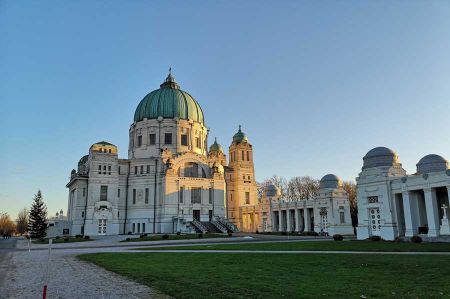Eerily beautiful - the central cemetery in Vienna
- Written by Portal Editor
Every city, like every country, has its own bizarre peculiarities, so we were more than surprised about the central cemetery in Vienna during a conversation when we found out that the cemetery is also used as a park and green area by the Viennese.
Yes, it does go so far that joggers use the huge park for their runs almost every day and bookworms devour the latest bestseller in a relaxed and calm atmosphere, provided the weather is good.
Traffic in and at the central cemetery in Vienna
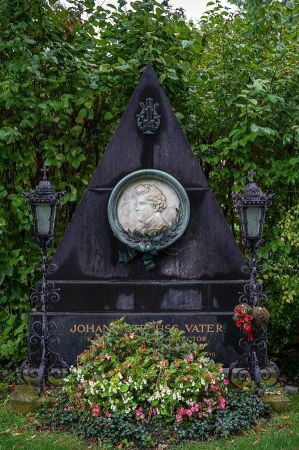 The central cemetery also belongs to the eastern green and recreation belt of Vienna. Due to its size and the partly dense tree population, it even houses a diverse fauna. The most common are the many squirrels, which the Viennese call "Hansi" and are comparatively trusting, since they are often fed with nuts by cemetery visitors. Less well known are the largest "animal inhabitants" of the cemetery, around 20 deer, which are mainly found on the site of the old Jewish cemetery, not least because of the evergreen plants growing around the old tombstones, which are particularly reliable in the colder seasons as food source. In addition, the central cemetery offers a habitat for kestrels, hamsters, badgers, martens, frogs and other small animals.
The central cemetery also belongs to the eastern green and recreation belt of Vienna. Due to its size and the partly dense tree population, it even houses a diverse fauna. The most common are the many squirrels, which the Viennese call "Hansi" and are comparatively trusting, since they are often fed with nuts by cemetery visitors. Less well known are the largest "animal inhabitants" of the cemetery, around 20 deer, which are mainly found on the site of the old Jewish cemetery, not least because of the evergreen plants growing around the old tombstones, which are particularly reliable in the colder seasons as food source. In addition, the central cemetery offers a habitat for kestrels, hamsters, badgers, martens, frogs and other small animals.
Until the mid-1980s, the cemetery area was even an official hunting area and the animal population was controlled by hunters appointed by the forest administration. Nowadays attempts are made to maintain the ecological balance even without the use of rifles by the environmental protection department of the City of Vienna, which with its nature and habitat protection program Network Nature ensures that, apart from the well-kept avenues and rows of graves, overgrown, near-natural areas are also preserved.
Traffic in and at the central cemetery
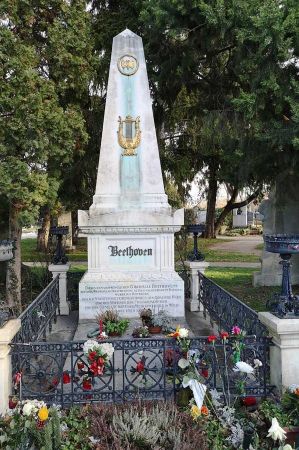 We use Simmeringer Hauptstraße, probably the most important traffic artery in the Simmering district, before there was new access from the city center to Vienna Airport with the construction of the motorway and the Rennweg in front of it. This part of the historic trunk road to Budapest leads directly to the central cemetery and thus makes a significant contribution to its accessibility. The closer we get to the cemetery, the closer the stonemason shops, the flower shops and other companies connected to the ongoing cemetery business become.
We use Simmeringer Hauptstraße, probably the most important traffic artery in the Simmering district, before there was new access from the city center to Vienna Airport with the construction of the motorway and the Rennweg in front of it. This part of the historic trunk road to Budapest leads directly to the central cemetery and thus makes a significant contribution to its accessibility. The closer we get to the cemetery, the closer the stonemason shops, the flower shops and other companies connected to the ongoing cemetery business become.
We have an appointment with our friend Bertl, who has not been there when we arrive. We use the time to get a first overview, so we also notice the souvenir shop right at the entrance portal. We enter and a young woman asks us about our plan. The slightly bizarre approach to the way of thinking about life and death quickly becomes apparent again. After information about the museum that deals with the tomb and burial culture of history and the belonging to the different religions and believes, there is also a reference to a beautiful café right next to it with a curious slogan: "Enjoy your coffee and stay forever!"
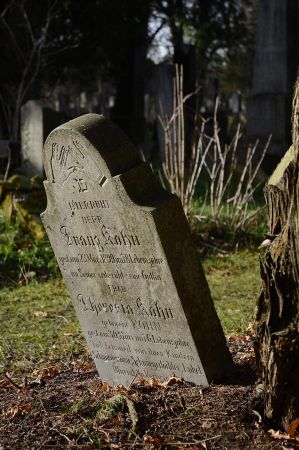 We are astonished a little, we have never encountered such a way of dealing with death (what is in the coffee to stay forever could come to mind).
We are astonished a little, we have never encountered such a way of dealing with death (what is in the coffee to stay forever could come to mind).
We decide to skip the café for today, despite the tempting offer of various, deliciously scented drinks and fresh pastries and cakes.
Our view then goes to the souvenir shop (which cemetery worldwide has a souvenir shop) and remains attached to the T-shirts on display: Zentralfriedhof - you are correct laying here for ever! it says. A completely new perspective opens up in front of our eyes.
And even though the cemetery is located between this busy street and the route of the airport express train, the vastness of the area completely spares traffic noise from the area.
However, a flight route of the airport located southeast of Vienna at a low altitude directly above the central cemetery leads to impairments to the cemetery rest.
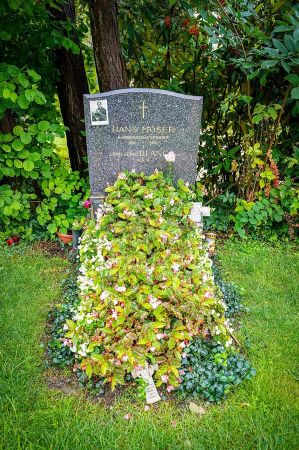 The coffeehouse mentioned above has been housed in one of the historic pavilions on the initiative of the cemetery administration since April 2018. With windows and sidewalk garden it opens up to the cemetery grounds. In the building there is also the info point, a computer terminal to find the locations of grave sites, which makes perfect sense.
The coffeehouse mentioned above has been housed in one of the historic pavilions on the initiative of the cemetery administration since April 2018. With windows and sidewalk garden it opens up to the cemetery grounds. In the building there is also the info point, a computer terminal to find the locations of grave sites, which makes perfect sense.
The central cemetery has considerable distances due to its size. It´s main routes can also be traveled by car for a fee because of that. On November 1st (All Saints' Day) entry is not permitted, as the risk of traffic chaos would be too high on this day. Persons with a corresponding disability card are generally exempt from fees and may also drive into All Saints' Day.
The cemetery has had its own cemetery bus since 1971 to make it easier for people without a car to reach remote graves. During the day, except on All Saints' Day, it crosses the majority of the cemetery grounds every half hour from Gate 2 as a circular route and serves 19 numbered stops. Around 60,000 passengers use this transport service every year. The various stops in the park area say all about the seize already.
Historical grove and graves of honor - Falco is one of them
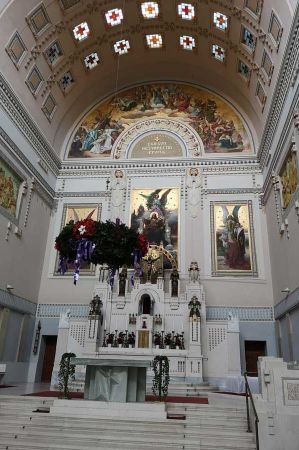 When the first group of honorary graves was started in 1885, the concentration of graves of prominent deceased was to increase the attractiveness of the cemetery.
When the first group of honorary graves was started in 1885, the concentration of graves of prominent deceased was to increase the attractiveness of the cemetery.
Since 1954, in addition to the honorary graves in the honorary grave groups, there are also the honorary graves category, which are either in group 40 (Ehrenhain) or occasionally in other groups on the cemetery grounds. There are currently more than 350 honorary graves and more than 600 honorary graves in the central cemetery.
However, one of the most frequently visited tombs by tourists, that of Wolfgang Amadeus Mozart, is only a memorial, since the remains of Mozart are in the St. Marx cemetery (where the exact location of Mozart's tomb cannot be determined, however, due to the Josephinian I reforms buried in a shaft grave).
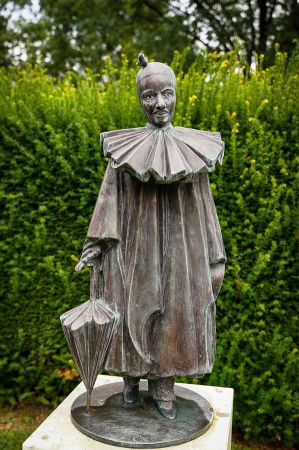 The Ehrenhain in group 40 houses honorary graves of mostly deceased personalities after the 1960s. By far the most visited grave in this group is that of the pop star Falco, who died in 1998 and has become a real pilgrimage site for Falco fans.
The Ehrenhain in group 40 houses honorary graves of mostly deceased personalities after the 1960s. By far the most visited grave in this group is that of the pop star Falco, who died in 1998 and has become a real pilgrimage site for Falco fans.
The central cemetery was immortalized musically by the Austro pop musician Wolfgang Ambros, whose friend and lyricist Joesi Prokopetz was inspired by a poster on the occasion of the 100th anniversary of the central cemetery to one of his greatest successes, the song “Long live the central cemetery " in 1974.
Scary and beautiful – the Central Cemetery of Vienna
The Vienna Central Cemetery is more than just a final resting place – it is a place full of history, art and mysticism. With its monumental graves, impressive Art Nouveau buildings and unique atmosphere, it attracts thousands of visitors every year. As one of the largest cemeteries in Europe, the Central Cemetery not only tells of transience, but also of the magnificent culture of Vienna.
In this blog we delve deep into the history, the famous personalities, the impressive architecture and the mysterious legends of this unique place.
The history of the Vienna Central Cemetery
Why was the Central Cemetery founded?
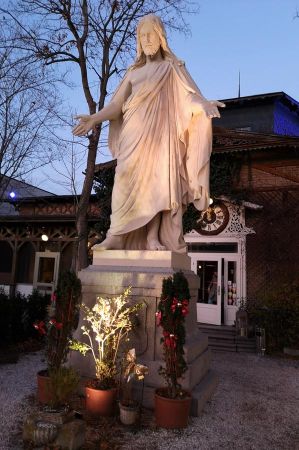 In the middle of the 19th century, Vienna's population grew rapidly and the existing cemeteries within the city became too small. The city administration therefore decided to build a large-scale burial site outside the city centre.
In the middle of the 19th century, Vienna's population grew rapidly and the existing cemeteries within the city became too small. The city administration therefore decided to build a large-scale burial site outside the city centre.
The choice fell on a site in Simmering, and so the Vienna Central Cemetery was officially opened on November 1, 1874.
Although it was initially met with scepticism - many Viennese people felt that the cemetery was too far away and impersonal - over the decades it became one of the most important burial sites in Europe.
Today it covers an area of 2.5 km² and is home to around 330,000 graves with over three million deceased.
The impressive architecture of the Central Cemetery
The Cemetery Church of Saint Charles Borromeo
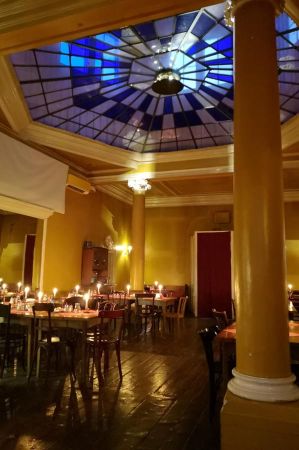 An architectural jewel of the Central Cemetery is the Cemetery Church of Saint Charles Borromeo, also known as the Dr. Karl Lueger Memorial Church. This impressive church was built between 1908 and 1911 in the Viennese Art Nouveau style and is a masterpiece by the famous architect Max Hegele.
An architectural jewel of the Central Cemetery is the Cemetery Church of Saint Charles Borromeo, also known as the Dr. Karl Lueger Memorial Church. This impressive church was built between 1908 and 1911 in the Viennese Art Nouveau style and is a masterpiece by the famous architect Max Hegele.
With its striking green dome, magnificent stained-glass windows and artistic decorations, it is a central attraction for visitors. The church serves not only as a place of remembrance, but also as an architectural landmark in Vienna.
The monumental graves of honour
The Vienna Central Cemetery is known for its impressive graves of honour. Numerous famous people have been buried in specially designed areas. These graves are often decorated with elaborate monuments, statues and unique inscriptions.
Famous people at the Central Cemetery
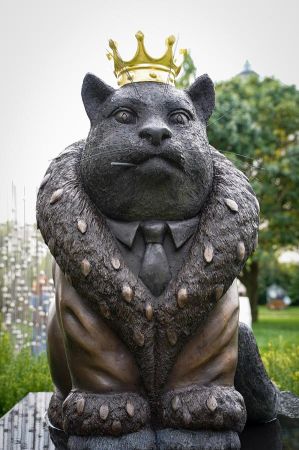 The Central Cemetery is the final resting place of many outstanding figures from music, art, science and politics. Here are some of the most famous names:
The Central Cemetery is the final resting place of many outstanding figures from music, art, science and politics. Here are some of the most famous names:
The great composers of Vienna
Vienna is considered one of the most important music metropolises in the world, and many of the most famous composers have found their final resting place here:
- Ludwig van Beethoven – One of the most influential composers of all time, known for his symphonies and piano works.
- Johannes Brahms – Famous composer of the Romantic era with masterpieces such as the German Requiem.
- Franz Schubert – Genius of Viennese Classicism and Early Romanticism, known for his song cycles and symphonies.
- Johann Strauss Father & Son – The masters of Viennese waltzes and operetta music.
Politicians and public figures
- Dr. Karl Lueger – The former mayor of Vienna, after whom the magnificent cemetery church was named.
- Bruno Kreisky – One of Austria's most famous chancellors.
Actors, writers and artists
- Falco (Johann Hölzel) – The legendary Austrian pop star, known for hits such as Rock Me Amadeus.
- Helmut Qualtinger – Cabaret artist and actor, famous for his satirical works.
- Fritz Muliar – One of the most popular Austrian actors of the 20th century.
The honorary graves are particularly impressive to visitors as they reflect Vienna's cultural diversity and keep the city's history alive.
Mysterious Stories and Myths of the Central Cemetery
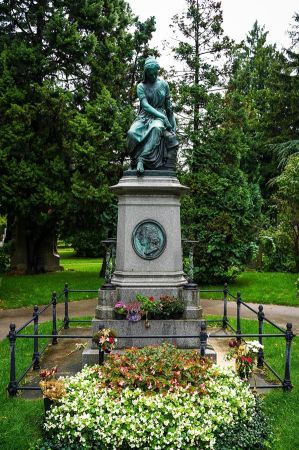 No old cemetery is without legends and mysterious stories - and the Central Cemetery is no exception. Here are some of the most famous tales:
No old cemetery is without legends and mysterious stories - and the Central Cemetery is no exception. Here are some of the most famous tales:
The Ghost of Beethoven and Schubert
One of the most famous stories says that the ghosts of Beethoven and Schubert were often sighted during the night hours. Both composers were originally buried at the Währing Local Cemetery before their remains were transferred to the Central Cemetery. Visitors report strange sounds and eerie apparitions near their graves.
The "Gate to the Underworld"
There is an old legend that says that a certain grave in the Central Cemetery serves as a gate to the underworld. Strange shadows are said to appear here on full moon nights, and some visitors report an inexplicable feeling of cold in certain areas of the cemetery.
The Secret Passages Under the Cemetery
Rumours say that a network of secret catacombs and tunnels exists beneath the Central Cemetery, which were once used for various purposes. Historians have not found any concrete evidence for this, but these myths contribute to the mysterious aura of the cemetery.
The Central Cemetery as Vienna's green oasis
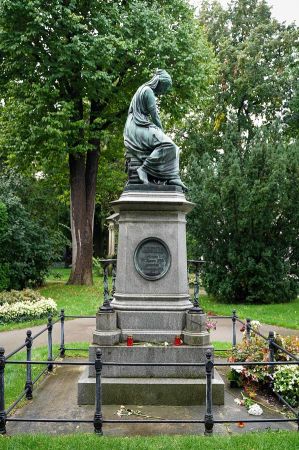 Despite its dark history, the Central Cemetery is also an oasis of peace and nature. With its extensive green areas, old trees and picturesque avenues, it offers a unique retreat in the middle of the big city.
Despite its dark history, the Central Cemetery is also an oasis of peace and nature. With its extensive green areas, old trees and picturesque avenues, it offers a unique retreat in the middle of the big city.
Flora and fauna in the cemetery
The Central Cemetery is home to a diverse range of flora and fauna. Visitors can observe deer, hares, foxes and rare bird species, among others. The cemetery reveals its full beauty especially in autumn, when the leaves bathe the paths in golden colours.
The Forest Cemetery - A special resting place
A special area of the Central Cemetery is the Forest Cemetery, where urn burials are possible in a natural environment. This area is particularly popular with people who prefer an environmentally friendly and nature-oriented burial.
Visiting tips for the Central Cemetery
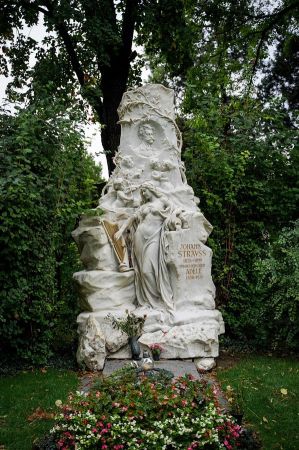 If you want to visit the Central Cemetery in Vienna, here are some tips:
If you want to visit the Central Cemetery in Vienna, here are some tips:
Address: Simmeringer Hauptstraße 234, 1110 Vienna
Opening times: Open daily, exact times depending on the season
Admission: Free
Accessibility: By tram line 71 or subway line U3 (Simmering station)
Best times to visit
- Spring and autumn: The picturesque colours make the cemetery particularly worth seeing.
- All Saints Day (November 1st): On this holiday, many Viennese people go out to honour their deceased relatives - a unique experience.
- Foggy mornings: If you want to experience the spooky-beautiful ambience in full intensity, you should visit the cemetery early in the morning when it is foggy.
Conclusion: The Central Cemetery - A place between life and death
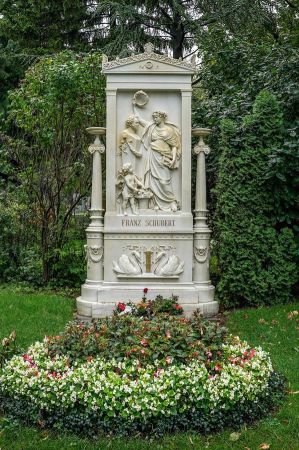 The Vienna Central Cemetery is much more than just a cemetery - it is a piece of cultural history, an oasis of silence and a place that tells fascinating stories. Between artistic graves, historical monuments and mysterious myths, this cemetery offers a unique mix of awe, beauty and mysticism.
The Vienna Central Cemetery is much more than just a cemetery - it is a piece of cultural history, an oasis of silence and a place that tells fascinating stories. Between artistic graves, historical monuments and mysterious myths, this cemetery offers a unique mix of awe, beauty and mysticism.
Whether you are a music lover, history buff or just looking for an unusual destination - the Central Cemetery will captivate you with its spooky-beautiful atmosphere.
Have you ever visited the Central Cemetery? Share your impressions in the comments!
Please read as well:
The Brunnenmarkt - an oriental street market in Ottakring
Tour through Vienna and short introduction to history of Fiaker
-
 Central Cemetry Vienna - Park For Leisure too
Central Cemetry Vienna - Park For Leisure too
Central Cemetry Vienna - Park For Leisure too
Central Cemetry Vienna - Park For Leisure too
-
 Central Cemetry Vienna - Park For Leisure too
Central Cemetry Vienna - Park For Leisure too
Central Cemetry Vienna - Park For Leisure too
Central Cemetry Vienna - Park For Leisure too
-
 Central Cemetry Vienna - Park For Leisure too
Central Cemetry Vienna - Park For Leisure too
Central Cemetry Vienna - Park For Leisure too
Central Cemetry Vienna - Park For Leisure too
-
 Central Cemetry Vienna - Park For Leisure too
Central Cemetry Vienna - Park For Leisure too
Central Cemetry Vienna - Park For Leisure too
Central Cemetry Vienna - Park For Leisure too
-
 Central Cemetry Vienna - Park For Leisure too
Central Cemetry Vienna - Park For Leisure too
Central Cemetry Vienna - Park For Leisure too
Central Cemetry Vienna - Park For Leisure too
-
 Central Cemetry Vienna - Park For Leisure too
Central Cemetry Vienna - Park For Leisure too
Central Cemetry Vienna - Park For Leisure too
Central Cemetry Vienna - Park For Leisure too
-
 Central Cemetry Vienna - Park For Leisure too
Central Cemetry Vienna - Park For Leisure too
Central Cemetry Vienna - Park For Leisure too
Central Cemetry Vienna - Park For Leisure too
-
 Central Cemetry Vienna - Park For Leisure too
Central Cemetry Vienna - Park For Leisure too
Central Cemetry Vienna - Park For Leisure too
Central Cemetry Vienna - Park For Leisure too
-
 Central Cemetry Vienna - Park For Leisure too
Central Cemetry Vienna - Park For Leisure too
Central Cemetry Vienna - Park For Leisure too
Central Cemetry Vienna - Park For Leisure too
-
 Central Cemetry Vienna - Park For Leisure too
Central Cemetry Vienna - Park For Leisure too
Central Cemetry Vienna - Park For Leisure too
Central Cemetry Vienna - Park For Leisure too
-
 Central Cemetry Vienna - Park For Leisure too
Central Cemetry Vienna - Park For Leisure too
Central Cemetry Vienna - Park For Leisure too
Central Cemetry Vienna - Park For Leisure too
-
 Central Cemetry Vienna - Park For Leisure too
Central Cemetry Vienna - Park For Leisure too
Central Cemetry Vienna - Park For Leisure too
Central Cemetry Vienna - Park For Leisure too
-
 Central Cemetry Vienna - Park For Leisure too
Central Cemetry Vienna - Park For Leisure too
Central Cemetry Vienna - Park For Leisure too
Central Cemetry Vienna - Park For Leisure too
-
 Central Cemetry Vienna - Park For Leisure too
Central Cemetry Vienna - Park For Leisure too
Central Cemetry Vienna - Park For Leisure too
Central Cemetry Vienna - Park For Leisure too
-
 Central Cemetry Vienna - Park For Leisure too
Central Cemetry Vienna - Park For Leisure too
Central Cemetry Vienna - Park For Leisure too
Central Cemetry Vienna - Park For Leisure too
https://www.alaturka.info/en/austria/vienna/4966-eerily-beautiful-the-central-cemetery-in-vienna#sigProIde8b16aa935
